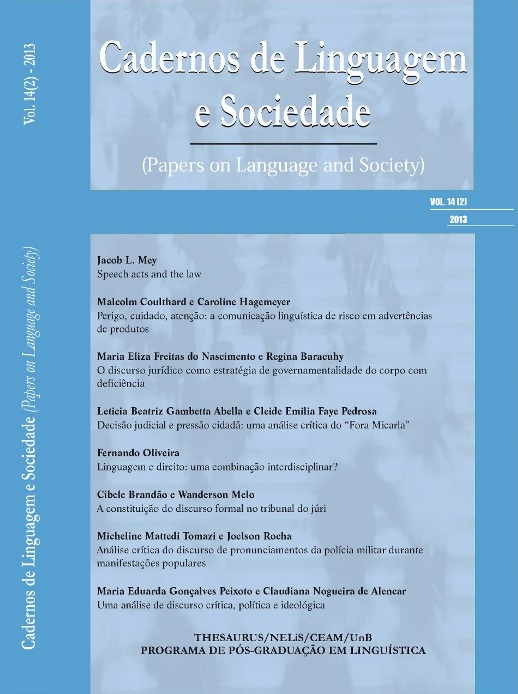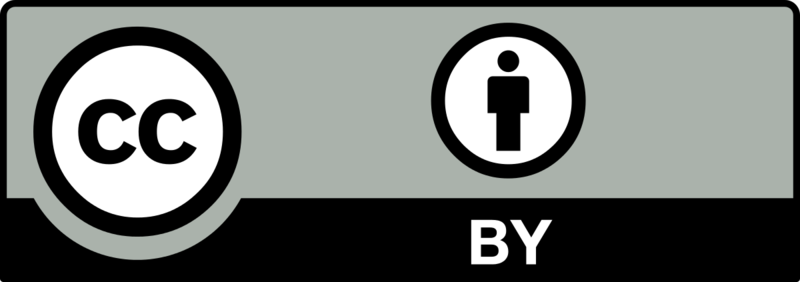Linguagem e direito: uma combinação interdisciplinar?
DOI:
https://doi.org/10.26512/les.v14i2.9216Palavras-chave:
Linguagem; Direito; Interdisciplinaridade.Resumo
A presente pesquisa bibliográfica buscou abranger algumas extensões em que a linguagem e o direito se entrelaçam. Desse modo, pretendeu-se discutir o campo interdisciplinar entre linguagem e direito e sua relação com disciplinas autônomas do direito e da linguística. Para isso, sugeriuse a relação inseparável de disciplinas como a filosofia da linguagem e direito, direito e literatura, direito e semiótica, que despertaram pesquisas pelo mundo, em especial nos Estados Unidos e Grã-Bretanha. Além disso, v explorou-se a retórica, a sociolinguística, a análise do discurso, a linguística forense para desvendar como essas ciências têm construído significados e estabelecido poder na sociedade contemporânea, tendo a linguagem como suporte principal para construir essas relações. Apesar da profícua e instigante relação de ambas as ciências, sugere-se a disseminação desse campo das ciências humanas como sendo de suma importância para os fazeres linguístico e jurídico.
Downloads
Referências
BIX, Brian. Law, language, and legal determinacy. Oxford: Charendon Press, 1993.
BODDE, Derk, and Clarence MORRIS. Law in imperial China. Philadelphia: University of Pennsylvania Press, 1973.
BRASIL. Constituição (1988). Constituição [da] República Federativa do Brasil. Brasília, DF: Senado Federal.
BRYAN, A. Garner. Black’s Law Dictionary. 9th ed. West Group, 2009.
CALMON DE PASSOS, J.J. Instrumentalidade do processo e devido processo legal. Revista de processo, v. 102, São Paulo, 2001.
CONLEY, John M., and William M. O’Barr. Rules versus relationships: The ethnography of legal discourse. Chicago: University of Chicago Press, 1990.
CORCOS, Christine Alice. An international guide to law and literature. Buffalo, N.Y.: William S. Hein & Co., 2000.
COTTERILL, Janet. Language and power in court: A linguistic analysis of the O.J. Simpson trial. Houndmills: Palgrave, 2003.
COULTHARD, Malcom. Whose voice is it? Invented and concealed dialogue in written records of verbal evidence produced by the police. Language in the legal process 19 (Janet Cotterill ed.). Houndmills: Palgrave, 2002.
CUNHA E CRUZ, Marco Aurélio Rodrigues da. A evolução conceitual da liberdade de expressão na jurisprudência do Supremo Tribunal Federal. Espaço Jurídico, v. 11, p. 402-421, 2011.
EADES, Diana. Applied linguistics and language analysis in asylum seeker cases. Applied Linguistics 26:503-526, 2005.
EHRLICH, Susan. Representing rape: Language and sexual consent. London: Routledge, 2001.
FISH, Stanley. Doing what comes naturally: Change, rhetoric, and the practice of theory in literary and legal studies. Durham: Duke University Press, 1989.
FUNAI. Legislação indigenista brasileira. 3ª edição. Brasília: FUNAI/CGDOC, 2005.
GIBBONS, John. Forensic linguistics: An introduction to language in the justice system. Oxford: Blackwell Publishing, 2003.
GOODRICH, Peter. Legal discourse: Studies in linguistics rhetoric and legal analysis. London : Macmillan, 1987.
GREENAWALT, Kent. Speech, crime, and the uses of language. Oxford: University Press, 1989.
GRICE, H.P. Logic and conversation. Studies in the way of words, 22-40. Harvard: University Press, 1989.
HAIMAN, Franklyn S. “Speech acts” and the First Amendment. Chicago: University press, 1993.
KURZON, Dennis. It is hereby performed: Legal speech acts. Amsterdam: John Benjamins, 1986.
LEVI, Judith. Language and the law: A bibliographic guide to social science research in the U.S.A. Chicago: American Bar Association, 1994.
MATOESIAN, Gregory. Law and the language of identity: Discourse in the William Kennedy Smith rape trial. Oxford: University Press, 2001.
MEGARRY, R.E. Miscellany-at-law: A diversion for lawyers and others. London: Stevens and Sons, 1958.
MELLINKOFF, David. The language of the law. London: Little, Brown & Co., 1963.
MILLER, Geoffrey P. Pragmatics and the maxims of interpretation. Wisconsin Law Review, 1990:1179.
POSNER, Richard. Law and literature: A misunderstood relation. Harvard: University Press, 1988.
QUINN, Susan. From orality to literacy in medieval Iceland. Old Icelandic literature and society 30 (Margaret Clunies Ross ed.). Cambridge: University Press, 2000.
SARAT, Austin, and Thomas b. Kearns (eds). The rhetoric of law. Ann Arbor: University of Michigan Press, 1994.
SHUY, Roger. Language crimes: The use and abuse of language evidence in the courtroom. Oxford Blackwell, 1993.
SINCLAIR, M.B. W. Law and language: The role of pragmatics in statutory interpretation. University of Pittsburgh Law Review 46:373, 1985.
SOLAN, Lawrence M. The language of judges. Chicago: University of Chicago Press, 1993.
_____. Law, Language and lenity. William & Mary Law Review 40:57, 1998.
_____. And Peter Tiersma. Speaking of crime: The language of criminal justice. Chicago: University Press, 2005.
STYGALL, Gail. Trial language: Differential discourse processing and discursive formation. Amsterdam: John Benjamins, 1994.
TEXAS Law Review. Symposium: Law and literature. University of Texas Law Review 60:373-586, 1982.
TIERSMA, Peter. Nonverbal communication and the freedom of “speech”. Wisconsin Law review, 1993: 1525-1589.
_____.Legal language. Chicago: University of Chicago Press, 1999.
_____. The new Black’s. Journal of Legal Education, 55:386, 2005.
_____. Toward more understandable jury instructions. Criminal Justice, 21:4, 2006.
VERSTEEG, Russ. Early Mesopotamian law. Durham: Carolina Academic Press, 2000.
WINTER, Steven L. A clearing in the forest: Law, life, and mind. Chicago: University of Chicago Press, 2001.
WYDICK, Richard. Plain English for lawyers (third edition). Durham: Carolina Academic Press, 1994.
Downloads
Publicado
Como Citar
Edição
Seção
Licença
Autores/as que publicam nesta revista concordam com os seguintes termos:
Autores/as mantêm os direitos autorais e concedem à revista o direito de primeira publicação, sendo o trabalho simultaneamente licenciado sob a Creative Commons Attribution 4.0 International license que permite o compartilhamento do trabalho com reconhecimento da autoria do trabalho e publicação inicial nesta revista.



